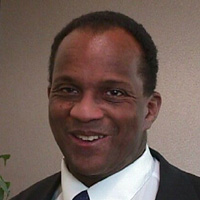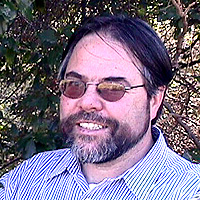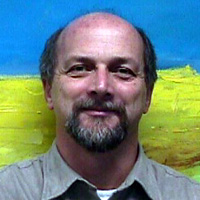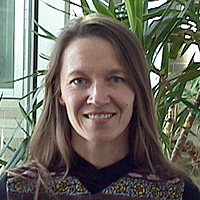 |
Edrie Sobstyl (University of Texas, Dallas), December 6, 2002, EESAT 130, 3:00 pm - 4:30 pm Is That Essence Rare? Ecofeminist Science Fiction Despite Teresa Brennan's recent observation that the charge of essentialism has become nothing more than an "exegetical cliche," ecofeminists continue to struggle with the question of female essence and its role in an environmentally restorative philosophy. While the debate frequently centers around the importance of differences between women, a broader underlying issue is the normative force of the female essence in ecofeminist politics. Science fiction is an underused resource in this controversy. In particular, a sympathetic reading of ecofeminist science fiction reveals that the problem of essence is parasitic upon a widely accepted but largely misconceived feminist critique of science. Ecofeminist science fiction can defray the impact of gender essentialism, and help to moderate its normative content. Edrie Sobstyl received her Ph.D. in feminist philosophy of science from the University of Alberta (Edmonton, Canada) in 1995. She teaches in the History of Ideas program at the University of Texas at Dallas, where she won the Outstanding Faculty Teaching Award in 1999. Her recent work includes a feminist interpretation of the epistemology of Wilfrid Sellars, an essay on revolutionary radio during the Salvadoran civil war, and a book on Star Trek. She held a fellowship from the Rockefeller Foundation in the Humanities at the University of Oregon earlier this year, where she began work on a long project on ecofeminist science fiction, to be called "Ground Crew for Spaceship Earth." |
|
Gary Varner (Texas A&M University), December 5, 2002, EESAT 130, 7:30 pm - 9:00 pm Personhood, Memory, and Elephant Management "Person" is a term of art in ethical theory, which is used to pick out individuals on the basis of cognitive abilities rather than species membership-individuals whose lives and/or interests have special moral significance in virtue of having special cognitive capacities. Varner discusses these special uses of the term "person." Locating the role of memory in the most plausible account of personhood, he explores the application of the term to elephants, and analyzes the practical moral significance of personhood so conceived in order to determine what kinds of scientific evidence would help us answer the question of whether or not various animals are persons. Varner wrote one of the first dissertations on environmental ethics and has since published a book and over 25 articles on related topics. His book, In Nature's Interests? Interests, Animal Rights and Environmental Ethics (Oxford University Press, 1998), provides an original analysis of what it means to have morally significant interests and examines the alleged divide between animal rights views and sound environmental policy. His published papers cover related topics in medical research, cloning, animal agriculture and human nutrition, as well as philosophical issues associated with the National Environmental Policy Act, the Endangered Species Act, and the property takings debate. |
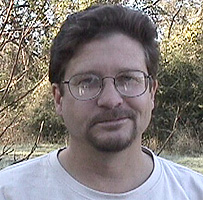 |
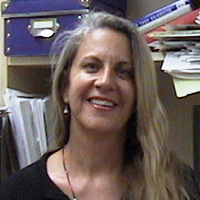 |
Krista Comer (Rice University), November 22, 2002, EESAT 130, 3:00 pm - 4:30 pm Ecotourism on Vacation: Surfer Girls and Surfing Ecosafari Dr. Comer explores the fascinating world of women's surf culture and its international/global/environmentalist dimensions. She will apply this exploration to the contemporary issues of ecotourism, ecofeminism, sustainability, and global environmental movements. She will argue that younger Americans (those of Gen X and Y) embrace ecopolitics, generally defined. Finally, she will comment on the idea of "girl power." Comer is Assistant Professor of English at Rice University. She is President of the Western Literature Association. Dr. Comer completed her Ph.D. from Brown University in American Studies in 1998. Her first book, Landscapes of the New West: Gender and Geography in Contemporary Women's Writing, was published by the University of North Carolina Press in 1999. She has also published essays on race and gender relations in the contemporary West, regionalism and transnationalism, the place of the literary in the New Western History, and the "post Civil Rights novel." Her current book in progress, From Gidget to Surfergirls, investigates both the history of women's surfing, and why "surfing" has emerged as the metaphor of choice for browsing the internet. It also attempts to bridge a divisive "feminist generation gap" between second wave feminists and younger women of Generation X and Y. |
|
Thomas Sheehan (Stanford University), November 1, 2002, EESAT 110, 7:30 pm - 10:00 pm What Will Heidegger Have Been? What Heidegger will have been depends in large measure on how one interprets key terms within his writings, for example, Sein and Dasein, Kehre and Ereignis, Geworfenheit and Entwurf,Geschichte and Entzug. Some would argue that more than a quarter century after his death, and after the publication of some eighty volumes of his writings, there is still no solid consensus on what Heidegger's "one and only thought" (Was heisst Denken? 24) was. Without pretending to answer that last question, the lecture will probe the possible meanings of key terms in Heidegger's thought, in the service of a revised understanding of what Heidegger has been and could yet be. Sheehan is a professor in the Department of Religious Studies at Stanford University. He is the coeditor with Richard E. Palmer of Edmund Husserl, Psychological and Transcendental Phenomenology, and the Confrontation with Heidegger (1997), the author of Karl Rahner: The Philosophical Foundations (1987) and The First Coming: How the Kingdom of God Became Christianity (1986), and the editor of Heidegger, the Man and the Thinker (1981). He is currently editing with Theodore Kisiel Philosophical Supplements: From Heidegger's Early Occasional Writings. |
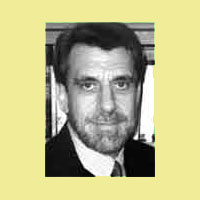 |
 |
Sahotra Sarkar (Texas A&M), September 24, 2002, EESAT 130, 7:30 pm - 9:00 pm The Aims and Structure of Conservation Biology When conservation biology emerged as an identifiable organized discipline in the late 1980s, it was already apparent that it would have to draw its principles and practices from many different biological specialties including genetics, evolution, and especially ecology. However, besides this single point of agreement, the practice of conservation biology diverged radically in different cultural and political contexts. Sahotra Sarkar is originally from India. He is a member of the History and Philosophy of Science Program in the Department of Philosophy at the University of Texas, Austin. His interests include the philosophy of biology and environmental philosophy. |
|
Stephen R. Kellert (Yale University School of Forestry and Environmental Studies), September 18, 2002, EESAT 130, 7:30 pm - 9:00 pm Connecting Human and Natural Systems: Scientific, Theoretical, and Practical Perspectives Stephen Kellert is a professor of social ecology at the Yale University School of Forestry and Environmental Studies. He is the author of Kinship to Mastery: Biophilia in Human Evolution and Development (Island Press, 1997); The Value of Life: Biological Diversity and Human Society (Island Press, 1996); The Biophilia Hypothesis (with E.O. Wilson, Island Press, 1993); The Good in Nature and Humanity: Connecting Science, Religion, and Spirituality with the Natural World (with T. Farnham, Island Press, 2002); Children and Nature: Psychological, Sociocultural, and Evolutionary Foundations (with P. Kahn, Jr., MIT Press, 2002); and Ecology, Economics, Ethics: The Broken Circle (with F.H. Bormann, Yale University Press, 1991). He is currently working on a new book: Ordinary Nature: The Role and Design of Natural Diversity in Everyday Life (University of California Press). |
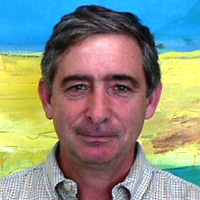 |
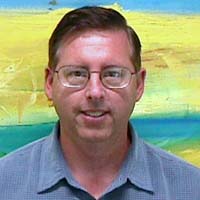 |
Robert Frodeman (Colorado School of Mines), March 28-29, 2002 Eco-Logic (EESAT 130, 03/28, 7:30pm - 9:00 pm) Frodeman argues that "geology" needs to incorporate all four aspects of our relation to the Earth: geoscience, geopoetry, geopolitics, and ecotheology. Science and the Public Self (EESAT 130, 03/29, 3:00 pm - 4:30 pm) What is the role of public science agencies in negotiating the boundaries between science and society? How does the scientist, and especially the public scientist, negotiate the twin dangers of irrelevance and bias? Frodeman specializes in environmental philosophy and philosophy of science policy. He has held positions at the University of Texas and the University of Tennessee, and has consulted for the U.S. Geological Survey for the last eight years. He is currently the 2001-2002 Hennebach Professor of the Humanities at the Colorado School of Mines. Frodeman is Principal Director of the New Directions Initiative , editor of Earth Matters: the Earth Sciences, Philosophy, and the Claims of Community (Prentice Hall, 2000), and author of Geo-Logic (SUNY, 2002). He is also Principal Investigator of the NSF-funded Global Climate Change and Society Program, where students explore the nature of scientific knowledge and the contribution that social scientific and humanistic perspectives play in public policy debates. |
|
Garth Baker-Fletcher (Independent Scholar), February 28, 2002, EESAT 130, 7:30 pm -9:00 pm African American Philosophies of Religion: Studies of Opacity and Oppugnancy Baker-Fletcher analyzes the ways in which African Americans have responded to the physical and psychological violence of racism by constructing various religious consciousness. Borrowing two terms from renowned historian of religion, Charles Long, he utilizes "opacity" and "oppugnancy" to reveal how African American religion has helped Blacks to develop various views of: the Holy, Self, Other-in-Relation, and Community. Baker-Fletcher is a specialist in African American religion and a Martin Luther King, Jr. expert. He is the author of Somebodyness: Themes of Dignity in the Writings of Martin Luther King, Jr. (1991), Xodus: An African American Male Journey (1995), My Sister, My Brother: Womanist and Xodus God-Talk (1997), and Dirty Hands: Christian Ethics in a World of Moral Ambiguity (2000). |
|
 |
George A. James (Department of Philosophy and Religion Studies, University of North Texas), February 22, 2002, EESAT 130, 3:00 pm - 9:00 pm India: Land of Phenomenal Biodiversity India is a country of phenomenal biodiversity. It is also home to a number of grassroots environmental movements that have received attention around the world. This talk will focus upon three such movements: the Chipko Movement of Uttar Pardesh, the Narmada Bachao Andolan (or Save the Narmada Movement) in Gujarat and Maharashtra, and Ralegan Siddhi, a village in a drought prone region of Maharashtra that through inspired leadership and local initiative transformed their village from poverty to plenty. The talk was illustrated by pictures taken by the speaker. James is an associate professor of philosophy in the Department of Philosophy and Religion Studies at the University of North Texas. His research interests are focused on comparative and Asian environmental philosophy. He is the author of Interpeting Religion: The Phenomenological Approaches of P. D. Chantepie de la Saussaye, W. Brede Kristenson, and Gerardus van der Leeuw (1995) and editor of Ethical Perspectives on Environmental Issues in India (1998). |
|
Ricardo Rozzi (University of Magallanes), February 21, 2002, EESAT 130, 7:30 pm - 9:00 pm Environmental philosophy and conservation biology complement each other by generating a better understanding of ecological systems and our human relationships as components of ecosystems. Many cases throughout Latin America show that the conservation of biological diversity promotes the conservation of cultural diversity and fosters better conditions of life for a constellation of local communities spread through the continent. At a practical level, this argument helps to overcome the prevailing dichotomy between developers and conservationists in Latin America. At a theoretical level this approach helps to integrate the epistemological and the ethical spheres by helping us understand both how we know about nature and how we inhabit it. Rozzi presents the approach undertaken by the Omora Environmental Ethics Center in Puerto Williams, Chile, in the Cape Horn Archipelago Region. Rozzi is a philosopher and ecologist and his research combines both disciplines through the study of the interrelations between the ways of knowing and inhabiting the natural world. Since the mid 1990s, with the aim of incorporating environmental ethics in the practices of conservation and education in Latin America, especially in Chile, he has collaborated with the Chilean Ministry of Education, the Ecology Schoolyard Program (coordinated by the Latin American Program of Audubon), and has participated in the creation of the Biological Station "Senda Darwin" (Chiloe, Chile), the Latin American Network of Ethnobotanical Parks and the Omora Ethnobotanical Park (Puerto Williams, Chile). Since 1998 he has been the representative for South America in the International Society of Environmental Ethics. Today, he is working in association with the University of Magallanes (Chile) in the consolidation of the Omora Environmental Ethics Center, which has the goal of integrating biocultural conservation and social well-being in the austral region and Latin America. |
|
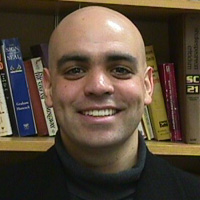 |
Alejandro de Acosta (Philosophy, Interpretation, and Culture, Binghamton University), February 14, 2002, EESAT 130, 7:30 pm - 9:00 pm The Challenges of Multinaturalism Recent attention to indigenous thought in the Americas has challenged the foundations of Latin American philosophy. Latin American philosophy has gone from misunderstanding, disparaging or ignoring indigenous cosmologies to becoming a translator of these ways of thinking. This work has brought out the concept of "multinaturalism" as a viable and coherent alternative to what could be called the "mononaturalism" of many other perspectives. Multinaturalism is linked to a similarly multiplicitous conception of embodiment and self that emphasizes human kinship with nonhuman animals and responsibilities towards invisible as well as visible realities. This work, which is at the intersection of Latin American philosophy and ecological thinking, can have great impact on environmental ethics, especially when it comes to issues related to zones populated by indigenous peoples. Alejandro de Acosta teaches classes on political philosophy, Spinoza, Deleuze and Guattari, technology and subjectivity, and Latin American philosophy in the Philosophy, Interpretation, and Culture Program at Binghamton University. He is co-host of the weekly political radio program "Bicho Raro" on WHRW-FM and editor of the independent electronic media digest "Thinking and Feeling." He recently translated a popular education pamphlet, El neoliberalismo. El programa de braceros. Los neo-braceros for use in immigrant Mexican communities and is working on translations of articles by Rofolfo Kusch and Enrique Dussel. |
|
Gary Machlis (National Park Service), February 7-8, 2002, EESAT Land Matters: The Struggle over Wilderness and Parks in Contemporary America, EESAT 130, February 7, 7:30 pm - 9:00 pm Throughout America's history and across its diverse landscapes, a central struggle has been constant: land matters. That is, much of the environmental controversies of the past and present have focused on the ownership and stewardship of land. In this lecture, a personal view of the driving forces shaping the struggle over wilderness and parks is presented, along with predictions (some hopeful, some grim) regarding the future of protected areas in contemporary America. The 7% Solution: Integrating the Social and Biological Sciences for Environmental Management, EESAT 130, February 8, 3:00 pm - 4:30 pm One of the most challenging tasks facing environmental science in the twenty-first century is understanding the relationship between social and biological systems. From conservation biology to climate change research to water resource studies, the integration of social and biological sciences is both a necessity and a difficult task, if progress is to be made in environmental management and protection. The lecture will examine why this merger is so necessary, and how it can be accomplished -- most likely by the next generation of environmental scientists. |
|
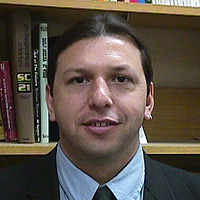 |
Robert Figuero (Department of Philosophy and Religion, Colgate University), February 1, 2002, EESAT Is There a Latino/a Environmentalism? Questions regarding the ways in which cultural values and environmental values intersect have long been a part of environmental philosophy. The emergence of the environmental justice movement has given this intersection a new centrality for sophisticated study. Figueroa presents a philosophical exploration of Latino/a environmental struggles that continue to shape the theoretical discourse of environmental justice. He first examines what philosophical controversies might emerge from a concept of Latino/a Environmentalism. He then goes on to explain that such a concept is both embedded in an environmental justice perspective and contributes to a variety of projects in environmental philosophy. He gives particular attention to ways in which the study of the title question enhances the meanings of environmental identity, environmental heritage, and the bivalence of environmental justice. Figueroa (Ph.D., University of Colorado at Boulder) is visiting assistant professor of the philosophy and religion department at Colgate University, where he mainly teaches social and practical ethics, environmental ethics, and environmental justice. His work has been published in several books, such as The Blackwell Companion to Environmental Philosophy; Faces of Environmental Racism: Issues in Global Justice (2nd ed), and The Environmental Justice Reader: Politics, Poetics, and Pedagogy. Figueroa's writings span a range of environmental justice studies including Latino/a issues, world heritage policy, justice and race theory, global politics, and environmental pedagogy. Current work includes his book Whose Environment? Which Justice?: Social Philosophy and Environmental Justice, and a co-edited book on the philosophy of science, technology, and diversity. |
